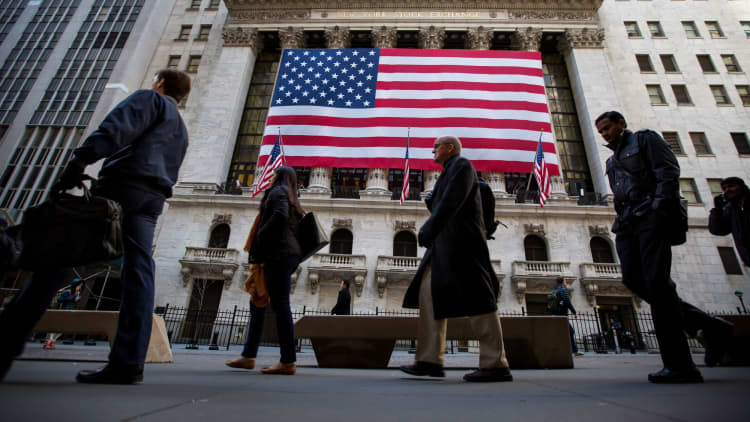
If the capital markets had to be characterized by one quality this year, it would be the low level of volatility. And if changes in investor behavior had to be characterized by one quality, it would be the rise of passive investing.
So are the two trends related?
Some experts, such as Sandler O'Neill research analyst Richard Repetto, see a connection.
"There's no one resounding answer to [why we've seen] this low volatility," Repetto, who covers the brokers and exchanges, said Tuesday on CNBC"s "Trading Nation." But the growth of assets in exchange-traded funds, which largely track indexes, "has had some impact."
Repetto pointed out that the first quarter of 2017 was the least volatile quarter for the in decades — which is just one among a host of stats showing how anomalous the lack of market movement has been.
Interestingly, this general decline in volatility has come in an environment in which it is not uncommon to see big volatility spikes in reaction to surprising events such as the U.K. vote to exit the European Union or Donald Trump's election.
The fact that the low level of realized volatility (which is distinct from, but largely explains, the low level of expected future volatility portrayed by the VIX) comes amid potentially anxiety-making world events leaves Repetto reaching for market structure-based causes.
"My explanation is that [high-frequency trading] and the growth of ETF assets are reducing volatility," Repetto wrote in a recent research note.
There may be something to this, acknowledged Seddik Meziani, professor of finance at Montclair State University's Feliciano School of Business.
"To a large extent, I disagree that low volatility is being caused by ETFs," Meziani, the author of three books about exchange-traded funds, told CNBC in a Thursday phone interview.
That said, "I would go so far as to say that it's exacerbated by this new tool. I would grant that maybe volatility wouldn't reach these highs and lows as easily if ETFs weren't around" given that "now you can express your sentiment toward the economy a little more easily."
Meziani's last point hints at a famous puzzle in finance. Why, academics such as Robert Shiller, have asked, are markets so much more volatile than the underlying economy?
"It has often been objected in popular discussions that stock price index are too 'volatile', i.e., that the movements in stock price indexes could not realistically be attributed to any objective new information, since movements in the indexes are 'too big' relative to actual subsequent movements in dividends," is how Shiller summed up the problem in a widely cited 1980 paper. And this was before stocks crashed in October 1987 for no apparent reason whatsoever.
When considered within this framework, it seems that fretting over the decline in volatility may be a bit silly — akin to demanding that a chef explain why a once-inedible dish no longer scorches the taste buds.
"If there is excess volatility due to non-fundamental reasons, eliminating it will result in lower volatility and more efficient markets," Stefano Giglio, associate professor of finance at the University of Chicago's Booth School at Business, wrote to CNBC on Monday.
"If market participants and arbitrageurs are able to eliminate some of the excess price fluctuations that are generated by deviations from fundamental values, this is certainly better for investors," Giglio added.
To be sure, it's far from obvious that a decline in volatility is good for investors.
As Ian Dew-Becker, assistant professor of finance at Northwestern's Kellogg school, pointed out in an email, it's hard to prove that equity volatility has indeed been higher than economic volatility.
On top of that, the recent decline in stock market volatility has come amid an "extremely stable" period for economic growth, which means that whether fundamental and actual volatility "have gotten closer to each other is a separate question that I don't know the answer to."
Finally, while reduced volatility lowers the risk of buying at a poor price, it also reduces the opportunity to buy at a great one.
Still, for the average investor who is more interested in seeing their money grow alongside the economy than in snatching up incredible bargains, the decline of volatility is probably a boon.
And the fact that one of the causes of this lower volatility may be their vehicle for doing so cheaply may be the icing on the cake.






